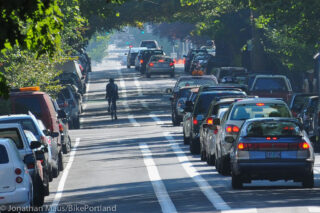
(Photo: J. Maus)
If left to their own devices, it’s very likely that any money raised by the Oregon Department of Transportation via decongestion pricing (also known as value pricing or congestion pricing) would be funneled right back into projects to make driving easier.
That would be a very bad move. Portland-based non-profit The Street Trust has launched a petition to encourage ODOT to do otherwise.
“Tell ODOT,” the petition headline reads, “Get Serious About Traffic and Invest in Transit, Biking, and Walking.”
Here’s the rest of The Street Trust’s call to action:
Building wider highways will not reduce traffic congestion. Instead, we can use congestion pricing as a method to reduce the number of cars on our streets and invest in better choices like walking, bicycling, and public transit. By following the example of cities like London, Stockholm, and Singapore, we can reduce traffic congestion and lead the nation in making it safe and easy to get around without a car. Congestion pricing must avoid negative impacts on low income people with options like rebates and increased transit.
We call on the Oregon Department of Transportation to use congestion pricing to reduce cars on our streets and fund a sustainable vision for the future of our city.
Advertisement
The Street Trust (whose Advocacy Director Gerik Kransky is on the Value Pricing Committee) has reason to be worried.
As per House Bill 2017, the transportation funding and policy package that passed last year, net proceeds from decongestion pricing must go into a newly established pot named the Congestion Relief Fund. While you might think the best way to relieve congestion is through better land-use, transit service, and good bikeway networks — ODOT and state legislators don’t. When they hear congestion relief, they think of wider freeways, more lanes on freeways, bigger ramps on and off freeways, and so on.
The largest expenditures in HB 2017 (which ODOT calls the Keep Oregon Moving program) are “congestion relief” projects that will widen Interstates 5, 205, and Highway 217. The I-5 Rose Quarter project itself will get $30 million per year starting in 2022.
If advocates have any hope of allowing decongestion pricing revenue to be spent on better bus service or bikeways, they’ll have to decouple the idea that “congestion relief” is synonymous with “freeway project.” This campaign by The Street Trust is likely just the start in a much larger battle that will unfold in the weeks and months to come as the Value Pricing Committee finalizes its recommendation to the Oregon Transportation Commission. That’s expected to happen this summer.
Learn more about ODOT’s decongestion relief policy and process here.
— Jonathan Maus: (503) 706-8804, @jonathan_maus on Twitter and jonathan@bikeportland.org
Never miss a story. Sign-up for the daily BP Headlines email.
BikePortland needs your support.

